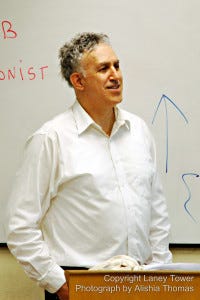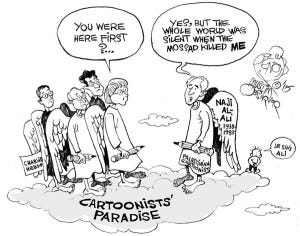Unrepentant political cartoonist Khalil Bendib, or self-proclaimed “Prez in the Fez” (so-titled because he ran for President of the United States under the “First Muslim in the White House” platform in 2008) visited the Mass Media and Society class Feb. 17 to discuss his political views and cartoons — his primary source of channeling his rage and disbelief surrounding the American political system.
Over the course of the one-hour talk, he touched on culinary metaphors (“Our freedom is like a fine gruyere cheese — full of holes”), waxed poetic about everybody’s favorite ex-commander-in-chief, George W. Bush (“The trouble with the French is they don’t have a word for entrepreneur”) and gleaned reason to the first steps in his becoming one of the foremost independent political cartoonists working in the U.S. today (“I don’t think of my stuff as radical, but the truth is radical”).
The truth is that Bendib is as radically minded as the most persevering political pundit, he just tapers his politics with genuine humor and artistry, and with a subtlety all too often lost in American politics.  Bendib’s parents were refugees of the Algerian Revolution (1954–62), which ultimately led to that country’s independence from France and forced Khalil to be born in Paris.
Bendib’s parents were refugees of the Algerian Revolution (1954–62), which ultimately led to that country’s independence from France and forced Khalil to be born in Paris.
His father was a political refugee, wanted by revolutionaries in his home country; so the family was whisked to safety in Paris, where he spent his toddler years. By the age of six he had spent the first three years in France and the second three in Morocco, and the political climate was such that the family could return to Algeria.
Bendib is a practicing Muslim, and his culture reflects a tapestry woven by imperialism — identifying with Algerian, French and American customs, politics and policies simultaneously.
This gives him a unique point of view, and one that can speak about imperialism, with its peaks and pitfalls, at a higher level than most.
He wondered aloud to the class “There are many with t-shirts and posters proclaiming ‘Je Suis Charlie,’ a reference to ‘Charlie Hedbo,’ the tragic massacre at the Parisian magazine in January. But how many of those same people would have proclaimed ‘Je Suis Ali’?”
This is a reference to Naji Al Ali, a prolific Palestinian cartoonist who frequently called attention to the Palestinian plight, and who was murdered for his beliefs in London in 1987.
Bendib calls the anti-Muslim sentiments of the modern day “anti-Semitism redux,” (described as “a diarrhea of apologies to the Jews after 1942, but only constipation for Muslims and indigenous people.”) Armed with that knowledge, he asks the question, “Where is that magic red line between freedom of expression and hate speech?”
Charlie Hebdo was one of the first to reprint the cartoon, again, not out of satire or journalistic duty, but rather to seem “ahead of the curve.”

Bendib also went deep into the history and repercussions of imperialism, an issue he has seen both sides of and knows quite well. He says that “France is stuck in a time warp of undigested colonial demons” (the food metaphors seem to strike a chord with the master culinary critic Bendib) and believes that a continuing injustice in France is still part of the problem, citing the fact that five million people, or a tenth of the French population, is Muslim. He points out that the French, as Americans, worry about their freedom, and this could be the purpose of the rallying cry behind Charlie Hebdo.
He also concedes that while freedom of religion and media is alive and well in France, the country has still never officially apologized for slavery or imperialism, much less offered reparations to those disenfranchised.
The “Prez in the Fez” left us with some salient points about political cartoons. He imparted the knowledge that political cartoons are both not serious and very serious at the same time, and the responsibility is up to these men and women to both make us chuckle and think — not an easy task when you’re medium is a 4”x4” space of newsprint and a pen.
However, he opines, “The pen is funnier than the sword,” and alludes to the difference between our modern war on terror and the fictional war on “error.” How different a world we would live in if we focused on eradicating error instead.

























